

Private and Personal Information. Technology / Privacy Policies of Popular Web Tools. Due to the COPPA law (Children's Online Privacy Protection Act), many websites require users under the age of 13, and sometimes under the age of 18, to obtain parent permission before creating an individual online account.
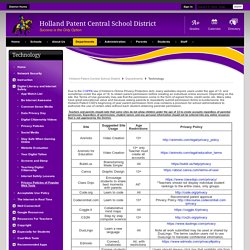
Depending on the site, the Terms of Use generally may ask that the permission come in the form of signed forms, credit cards, etc. Many sites have great educational value and because asking parents to repeatedly submit permission forms is burdensome, the Holland Patent CSD's beginning of year parent permission form now contains a provision for school administrators to authorize the use of certain sites without each student obtaining parental permission. Teachers and parents should note that some sites do not allow children under the age of 13 to create accounts regardless of parental permission. Regardless of permissions, student names and any personal information should not be entered into any online resources that is not approved by the District.
The FTC Has Its Sights on COPPA, and Edtech Providers Should Take Notice. Following September’s unprecedented $170 million settlement with YouTube for COPPA violations, the Federal Trade Commission (FTC) signaled its intent to aggressively pursue actions against websites and online services that violate COPPA.
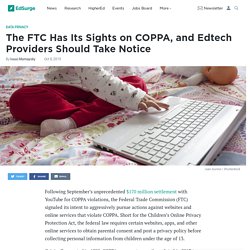
Short for the Children’s Online Privacy Protection Act, the federal law requires certain websites, apps, and other online services to obtain parental consent and post a privacy policy before collecting personal information from children under the age of 13. RPS - Software/Subscriptions/Resources Approval Status.
K-12 Leaders Unite for ‘Check the Privacy,’ a One-Stop Shop for Safe Classroom Tech. Home - SAMR Matrix. Five reasons schools need to address cybersecurity now. Even after recent high-profile incidents, cybersecurity can seem abstract and non-urgent, but of course, cybersecurity is a necessity in education.
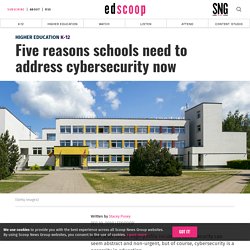
Schools have valuable information to protect for both students and employees. However, as financial and physical security issues arise, cybersecurity can fall down the list. As Ann McMullan, project director for the CoSN Empowered Superintendents Program reminded attendees at a recent webinar, cyberattacks are increasing in K-12 — from phishing attempts to outright hacks. Joining McMullan for “Cyber Security: A Critical School District Priority” were Steve Bradshaw, superintendent of Columbia Falls School District 6; Juan Cabrera, superintendent of El Paso ISD; and Dr.
Gary Lilly, superintendent of Bristol Tennessee City Schools. The presenters offered five reasons to make cybersecurity a priority: 1. Districts and school leaders can be held liable for network breaches. Will 2019 Be the Year of Privacy? Five Things to Look for in Education. This article is part of a collection of op-eds from thought leaders, educators and entrepreneurs who reflect on the state of education technology in 2018, and share where it’s headed next year.
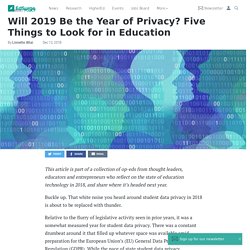
Buckle up. That white noise you heard around student data privacy in 2018 is about to be replaced with thunder. Relative to the flurry of legislative activity seen in prior years, it was a somewhat measured year for student data privacy. There was a constant drumbeat around it that filled up whatever space was available amid preparation for the European Union’s (EU) General Data Protection Regulation (GDPR). While the pace of state student data privacy legislation drafted remained relatively high—clocking in at approximately 117 bills and 22 new laws—the reaction from districts and edtech companies alike was much more subdued than in the past four years, likely because the idea that over 100 bills would be drafted on any one topic in a year is no longer met with shock. 1. 2. 3. 4.
Privacy Evaluation Initiative: Protect Student Privacy. The Unintentional Ways Schools Might Be Violating FERPA, and How They Can Stay Vigilant. Want to throw away old student records?
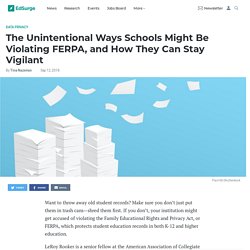
Make sure you don’t just put them in trash cans—shred them first. If you don’t, your institution might get accused of violating the Family Educational Rights and Privacy Act, or FERPA, which protects student education records in both K-12 and higher education. LeRoy Rooker is a senior fellow at the American Association of Collegiate Registrars and Admissions Officers. He’s a FERPA expert, having been the director of the Department of Education’s Family Policy Compliance Office for 21 years. That “clear violation of FERPA” is one of many he’s seen throughout the years, and he says it’s not just trash that schools and educators have to worry about.
Here are other unintentional ways they might be breaking the law, and what they need to be aware of in order to avoid consequences, which can include the Department of Education investigating the school (and the school then deciding to fire the offending educator). Be Careful with Vendors. 2016PA 00189 R00HB 05469 PA. Most Ed-Tech Products Don't Meet Minimum Criteria in Their Privacy Policies, Report Finds. A study by Common Sense finds that only 10 percent of the more than 100 ed-tech applications and services evaluated by the organization met minimum criteria for transparency and quality in their privacy policies.

The research uncovered what Common Sense called “a widespread lack of transparency, as well as inconsistent privacy and security practices” in its three-year review of how student information is collected, used, and disclosed on some of the most popular applications and services in education technology. In this research, “transparency” refers to whether the ed-tech providers are open about disclosing certain practices, or whether they explicitly allow those activities, including third-party marketing, behavioral advertising, tracking users, or creating profiles for the purpose of advertising.
“As they mention in their opening paragraphs, privacy and security are horribly complex. Common Sense has been evaluating apps and tools since June 2016. 500 We apologize, there was an unexpected error. Please try again later. Privacy Initiative. Most Ed-Tech Products Don't Meet Minimum Criteria in Their Privacy Policies, Report Finds. Popets 2018 0021. EdPrivacy is Student Data Privacy as a Service for U.S. K-12 Schools. StudentDataPrivacyToolkit V1.
Study: Why Some Children’s Apps Might Not Be as Safe as You Think. Ok Google, How Safe Is My Data? How to Do a Quick Privacy Checkup in Google Apps - BetterCloud Monitor. In Google Apps, head up to your account (the circular icon with your photo or your initial) > My Account > Personal info & privacy > Get started.
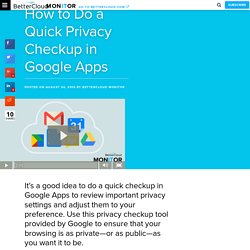
Choose what Google+ profile information you share with others You can select if people visiting your profile can see certain tabs in your profile, such as your photos, videos, +1s, or reviews. You can also click the “Edit What Others See About You” link if you want to directly edit what people can see about you in your Google+ profile. You can also fine tune settings related to communities. The last option is an important one. Manage what you share on YouTube Click Next. Manage your Google Photos settings You are given the option to auto-group photos by matching faces, and to remove geolocation in items shared by link. Personalize your Google experience Make ads more relevant to you Finally, the ad settings make up the last section in Google’s privacy checkup tool. Click here to watch this video on YouTube. Online Facilitated Privacy Course. Educators, students, and parents are now benefiting from the exciting opportunities available as a result of new instructional technologies, including cloud-based technology services and mobile applications.
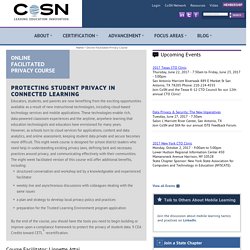
These technologies enable rich, data-powered classroom experiences and the anytime, anywhere learning that education technologists and educators have envisioned for many years. Google Online Game Teaches Kids Safety and Security. In celebration of Internet safety month, Google has released a classroom curriculum and computer game to teach children about online safety and security.
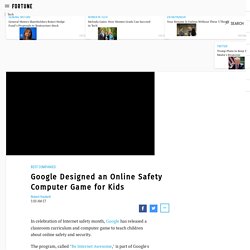
The program, called "Be Internet Awesome," is part of Google's effort to instill the youth with digital savvy and to encourage people to be good Internet citizens. The company teamed up with YouTube stars like John Green, the author and popular video blogger, to promote the initiative, which includes educational materials aimed at students in the third to fifth grades. Developed by Google (goog), the online game, called Interland, invites players to roam around four floating island worlds that contain challenges, puzzles, and quizzes related to online safety.
The game is free and accessible via all major Web browsers. Er9 Student Privacy. AN ACT CONCERNING STUDENT DATA PRIVACY. Substitute House Bill No. 5469 Public Act No. 16-189.
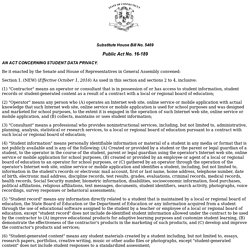
6 things schools can do to ensure student data privacy. Student data privacy is quite a different topic from the headlines most people read concerning data breaches. It is not about malicious intruders hacking or stealing credentials to get into a system to steal corporate intellectual property or records to sell on the dark web. Student data privacy concerns, specifically, center on the misuse of personally identifiable information, known by its acronym PII. This can be knowingly done for gain — i.e. marketing or future sales — or it can be done with good intentions, as in capturing and using data about an individual to deliver more tailored learning experiences.
Even if being done in the aggregate, there are still concerns of misuse. Student privacy first entered the national conversation in 1974, with the passage of the Family Educational Rights and Privacy Act (FERPA). Controversy over weakened laws. A new role for libraries: Promoting teens' privacy and safety in the digital age. Tracker Browser Extension.
This digital footprint, connected by tracking technologies (called trackers), helps companies build a profile about you and how you interact with their sites and competitors, allowing them to optimize their communications and site experience to reach you - at the right place, at the right time. While these trackers power much of the web's commerce and content, consumers increasingly wonder: How slow are these trackers making my web experience? Educational Technology / Web Apps and their Privacy, Safety and Security Ratings. Graphite Privacy Policy Browser. Welcome, Educators — ikeepsafe.org. Administrators and teachers are urgently looking for a proven system that will guide them through the complexities of Web 2.0. Too often, events like cyberbullying, sexting, plagiarizing and hacking push litigious chaos into the forefront of technology adoption, essentially stunting the development of digital citizenship progress.
HomeApp Centre. Student Data Principles. 10 Foundational Principles for Using and Safeguarding Students’ Personal Information. Protecting Privacy. Trusted Learning Environment (TLE) Seal CoSN’s newest privacy initiative is the Trusted Learning Environment (TLE) Seal. This initiative will allow school system leaders from across the country to communicate their privacy efforts to parents, communities, and other stakeholders while ensuring that the school system is adhering to best practices and taking steps in the right direction.
Visit the TLE website to learn more. 10 Principles to Guide the Use and Protection of Student Data CoSN and the Data Quality Campaign (DQC), along with 32 leading national education organizations, released 10 principles for protecting and guiding the use of the personal information of America’s students. To view and learn more about the principles, please visit the website. Protecting Privacy Toolkit Download here. CoSN Privacy Toolkit. TOS Guidance Jan%202015 0. Privacy Technical Assistance Center (PTAC) San José Public Library. The Educator’s Guide to Student Data Privacy. Educator’s Guide to Student Privacy. Additional Resources. CoSN Trusted Learning Environment. Pledge to Parents & Students – Leading School Service Providers Pledge to Advance Student Data Protections for Student Personal Information.
The Three Big Edtech Problems in Alabama—And How Schools Are Fixing Them. There are certain criteria that have long been established for instructional software or applications. Privacy Technical Assistance Center (PTAC) Pledge to Parents & Students.